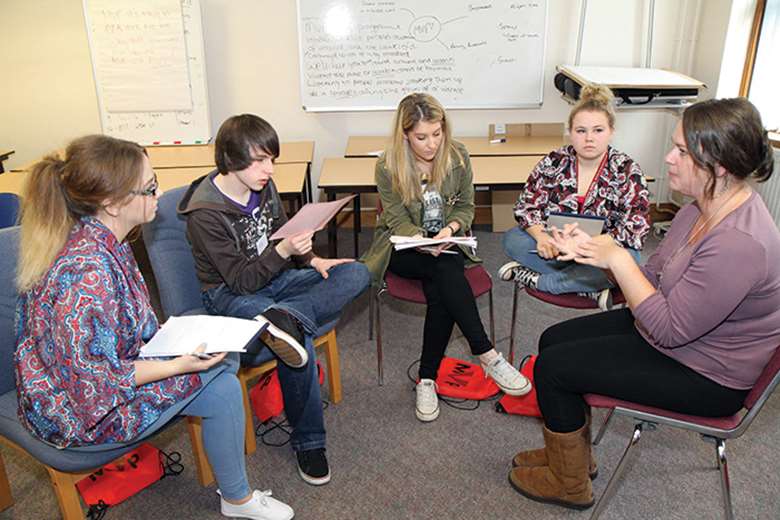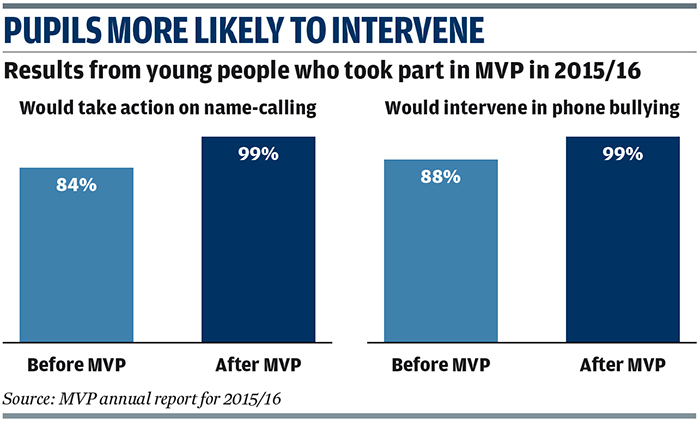How pupils get empowered to tackle bullying
Emily Rogers
Tuesday, September 26, 2017
Pupils are trained as mentors to support younger peers to examine scenarios of gender-based abuse and violence, and how to safely take action.

PROJECT
Mentors in Violence Prevention
PURPOSE
To prevent bullying, gender-based abuse, and other abuse and violence among young people
FUNDING
£450,000 of Scottish government funding over three years until March 2018
BACKGROUND
Mentors in Violence Prevention (MVP) was founded in 1993 by US educator Jackson Katz to stop all forms of gender abuse, by training student leaders to speak out.
It was imported to Scotland in 2011 by chief inspector Graham Goulden at the Scottish government's Violence Reduction Unit. He modelled Scotland's approach on an MVP initiative at an Iowa school, enlisting Katz's help in spreading it to six schools in Edinburgh and Inverclyde. MVP is now overseen by Education Scotland and has around 2,500 mentors in 120 schools across 23 authorities. Around 16,000 pupils have been reached so far.
ACTION
Schools identify between four and seven staff members, alongside community partners such as parents, educational psychologists or health staff, to train and support pupil mentors and embed MVP. Staff and partners have two days of training covering topics such as the impact of stereotypes on gender abuse and how schools can model respectful behaviour.
Teachers recruit at least 20 mentors, usually in the top two years. MVP provides staff with two-day mentor training plans, as well as lesson plans helping mentors deliver between three and five sessions to younger children at the beginning of secondary or end of primary school. These sessions focus on the MVP "playbook", outlining 14 scenarios involving pupils witnessing actual or potential abuse, such as dating abuse, sexting or bullying.
After agreeing to respect opinions and confidentiality, pupils read the playbook scenario, such as a friend circulating phone pictures of his naked ex-girlfriend. They are asked to put their hands up if they think something is wrong with this, which Goulden says "helps healthy norms become visible". "They start seeing that their friends think the same as them; making them feel more empowered," he explains.
Pupils then discuss the internal "train of thought" triggered by the incident; concerns and questions such as: "Can I get into trouble for this?" and "If I say something, will they laugh at me?" Mentors help allay these fears and lead discussion about the attitudes, cultural norms and media influence that can underpin such incidents.
Pupils then discuss safe action they could take and the consequences of doing nothing, directly intervening, or using distraction or disruption techniques. Through role play, they practise speaking to a teacher or a mentor about the incident. "We're asking them to develop a ‘heroic imagination'; practising what they'd do if they saw something happening," says Goulden, an MVP trainer and consultant for the Scottish Violence Reduction Unit, who retired from policing in June. "Psychologists often say the first step to being a hero is to imagine yourself being a hero."
OUTCOME
The 2015/16 MVP annual report includes the results of before and after surveys of participants. Before taking part in the programme, 84 per cent of 553 young people said they would "do something" if they witnessed name-calling such as speaking to a teacher or the perpetrator. However, this increased to 99 per cent among the 157 who completed post-MVP questionnaires. The percentage saying they would intervene in phone bullying increased from 88 to 99.
The percentage stating they would intervene after witnessing a peer showing "coercive control" in a relationship also increased; from 84 to 96 if a friend was trying to prevent a girlfriend or boyfriend spending time with friends and from 80 to 94 if the friend was trying to track their movements.
Teachers reported increasing cases of pupils sharing incidents of name-calling, bullying, or safety concerns, such as a fight brewing, or somebody bringing a sharp object to school. They also reported pupils disclosing domestic abuse and increasingly intervening safely in bullying or violence. One school saw exclusions drop from 24 in 2012/13 to eight in MVP's first year. Exclusions decreased to five in year two and none in year three.





